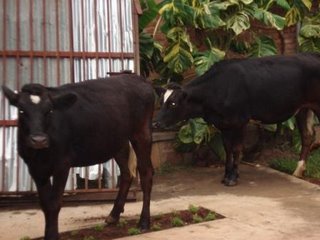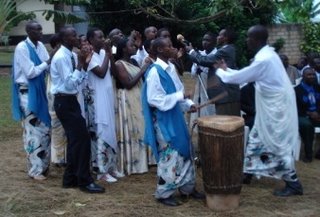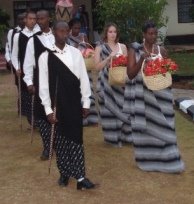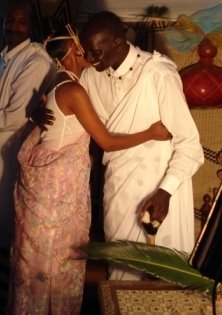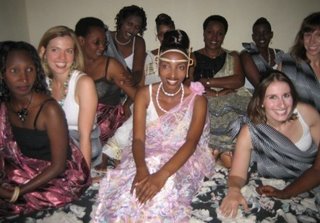
I realized recently that I haven’t really said anything about what I’m actually doing here!
My organization has its hand in a bunch of different things – our main mission is to provide VCT (Voluntary Counseling and Testing), psychosocial counseling and free medical care, and to ensure that women (especially those that were victims of rape during the genocide) have equity in access to these services. We also have a research branch that is following a cohort comprised of both HIV+ and HIV- women, a pediatric program, a (temporarily defunct) food program and IGPs (income generation projects), with other projects in the works all the time. Our office is in Centre Ville, but a lot of meetings are held at the house in Kiyovu, which is where I end up working from a lot of the time (not least because of the much more reliable internet connection and the presence of a kitchen).

The two main projects I’m working on are a Treatment Access & Food Security survey that Marianna and I designed together and a legal aid project aimed at educating community advocates to fight discrimination against people with HIV/AIDS. A major problem here is men who, upon finding out that their wives are HIV positive, abandon them and the children and take all the property. Often a husband will die and his relatives will show up to take back the land (and sometimes the children) from his widow. In some cases a woman who is HIV positive will not even be allowed to get married in the first place. All of these are illegal under Rwandan law, but most people have no idea what their rights are and so don’t fight for them. So I’ve been helping Megan, an international human rights lawyer, put together and run a legal workshop to educate representatives of our partner associations (nearly everything here is run through these associations, local grassroots organizations that represent particular groups within the population) about the law and to give them basic skills in legal advocacy & mediation, as well as connect them with local established legal clinics and legal aid & human rights groups that can help their members exercise their rights.

So far we’ve gone through the Rwandan Constitution (a pretty darn cool document, one of the most progressive in the world – highly recommended reading :)), international human rights law, mediation, marriage, property and succession. By the end we’ll have also covered children’s rights, the rights of women in non-civil marriages (e.g. those in polygamous households or regular marriages not registered by the State), confidentiality, the gacaca process, and laws relating to sexual violence. The first week I gave a lecture on HIV/AIDS (how I became the resident expert I have no idea) which was nerve-wracking but fun – especially watching Martin struggle to translate “vaginal secretions” into Kinyarwanda. I’m constantly giving him uncomfortable things to say in public :)

My other main project, the survey, is turning out to be incredibly interesting (if a logistical royal pain in the butt). Marianna and I put together a questionnaire (which we had translated into Kinyarwanda) to administer to the heads of all our partner associations – we have 25 of them right now – that (hopefully) will get at what kind of access their members, especially genocide survivors, have to VCT and treatment for HIV and OIs (the opportunistic infections that characterize AIDS), what obstacles to these services exist for those who have little or no access, and how best to fill those gaps. We also have a section on food security – a lot of patients are going off their ARVs because they have no food. This is obviously a complete disaster, both in terms of individual pati
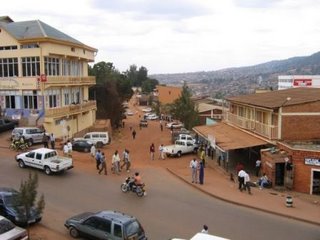
ent health and in terms of breeding drug resistance, so we’re trying to a) get the funding for our food program reinstated and b) find out ways to make people more self-sufficient after they graduate from the food program, whether through agricultural training and assistance, other skills training, or IGPs. Marianna & I are also doing some qualitative research, mostly interviews and focus groups (I
love focus groups!) with nurses and reps from some of the larger associations.

ACD, who is back in San Francisco now, works nonstop and her brain runs at a mile a minute, so every time we talk to her she gives us eight new things to do – it’s amazing that
anyone can keep up with her! So we’re pretty busy all the time, but I’m absolutely loving it. I think I may have found my new home away from home :) Plus I get to ride a motorcycle to work every day – what could be better than that??
 Today we visited Nyabiheke refugee camp, one of the sites where Jess works. We got there a little after noon, stopped by the office to pick up some things and greet everyone, then headed into the main part of camp. Nyabiheke is one of the smaller camps, with just under 5,000 residents, mostly from the Congo. UNHCR (the United Nations High Commissioner for Refugees) is in charge of these camps, and I must say, is running quite an operation, along with the ARC (American Refugee Committee), whom Jessica works for. Of course, the conditions are quite basic, but it is clear that the staff cares very deeply about the refugees and that they are supporting them as best they can. The head nurse showed us around their medical facilities, including the wards for men, women, and children,
Today we visited Nyabiheke refugee camp, one of the sites where Jess works. We got there a little after noon, stopped by the office to pick up some things and greet everyone, then headed into the main part of camp. Nyabiheke is one of the smaller camps, with just under 5,000 residents, mostly from the Congo. UNHCR (the United Nations High Commissioner for Refugees) is in charge of these camps, and I must say, is running quite an operation, along with the ARC (American Refugee Committee), whom Jessica works for. Of course, the conditions are quite basic, but it is clear that the staff cares very deeply about the refugees and that they are supporting them as best they can. The head nurse showed us around their medical facilities, including the wards for men, women, and children, 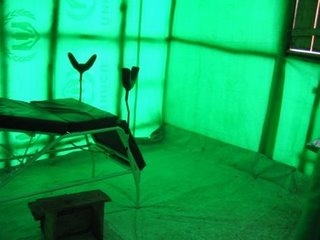 as well as the maternity ward (where, Jess tells us, they found a huge snake lurking not long ago – not a place I would choose to give birth - if I had the choice). The men’s ward was empty; in the children’s ward was a young boy who had injured himself falling out of a tree, as well as a couple other kids with malaria. Everyone in the women’s ward
as well as the maternity ward (where, Jess tells us, they found a huge snake lurking not long ago – not a place I would choose to give birth - if I had the choice). The men’s ward was empty; in the children’s ward was a young boy who had injured himself falling out of a tree, as well as a couple other kids with malaria. Everyone in the women’s ward had either malaria or typhoid or both. (HIV prevalence in the camp is extremely low – well under 1% at last count – the main medical problem by far is malaria). The omnipresent UNHCR tarp that acts as floor, walls, and ceiling in buildings
had either malaria or typhoid or both. (HIV prevalence in the camp is extremely low – well under 1% at last count – the main medical problem by far is malaria). The omnipresent UNHCR tarp that acts as floor, walls, and ceiling in buildings .jpg) throughout the camp cast a greenish glow over everything, making our surroundings feel a little eerie yet somehow appropriate.
throughout the camp cast a greenish glow over everything, making our surroundings feel a little eerie yet somehow appropriate..0.jpg) who was struck by lightning while fleeing the Congo to join his mother and sisters in the camp and speeds around quite well on his crutches, as well as a woman who has miraculously survived to 105 years old, and Kevin, possibly the cutest baby alive (and who turns out to be, in fact, a girl).
who was struck by lightning while fleeing the Congo to join his mother and sisters in the camp and speeds around quite well on his crutches, as well as a woman who has miraculously survived to 105 years old, and Kevin, possibly the cutest baby alive (and who turns out to be, in fact, a girl).

